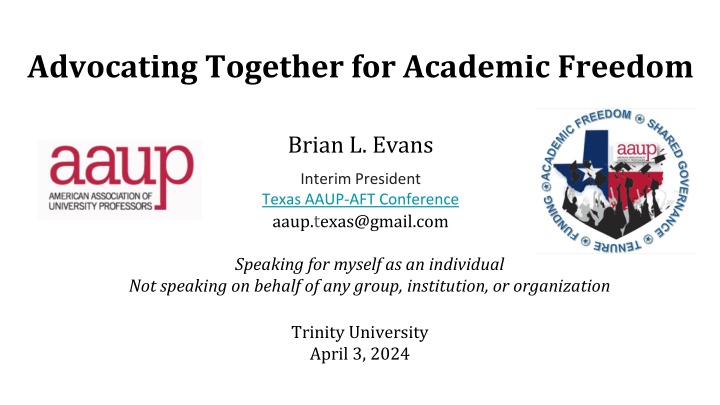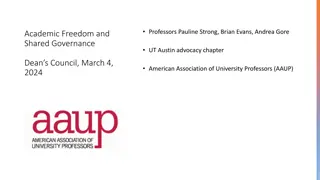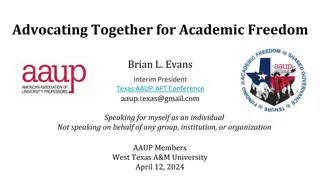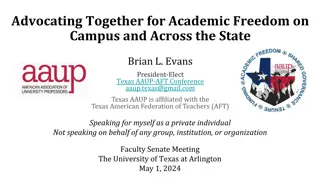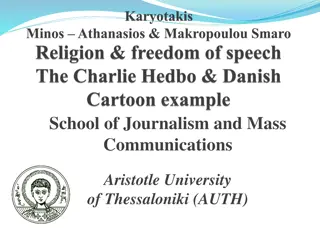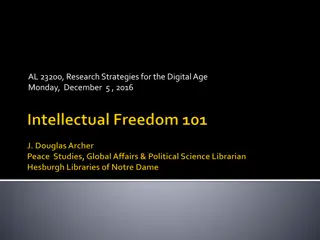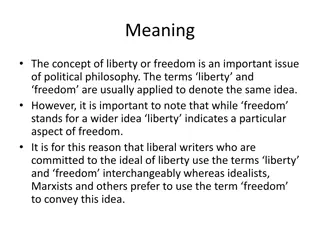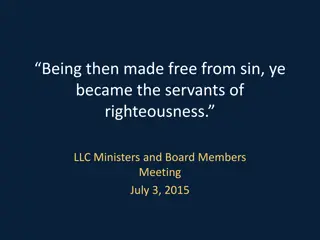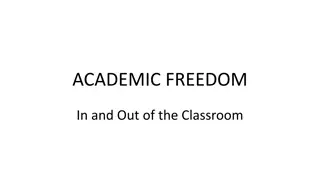Advocating Together for Academic Freedom
Advocating for academic freedom and shared governance in universities, Brian L. Evans highlights the principles outlined in the 1940 Joint AAUP/AAC&U Statement. The American Association of University Professors (AAUP) and the American Association of Colleges and Universities (AAC&U) play crucial roles in advocating for academic freedom, economic security, and quality education for faculty members. The 1966 statements emphasize the importance of faculty involvement in decision-making processes within educational institutions.
Download Presentation

Please find below an Image/Link to download the presentation.
The content on the website is provided AS IS for your information and personal use only. It may not be sold, licensed, or shared on other websites without obtaining consent from the author.If you encounter any issues during the download, it is possible that the publisher has removed the file from their server.
You are allowed to download the files provided on this website for personal or commercial use, subject to the condition that they are used lawfully. All files are the property of their respective owners.
The content on the website is provided AS IS for your information and personal use only. It may not be sold, licensed, or shared on other websites without obtaining consent from the author.
E N D
Presentation Transcript
Advocating Together for Academic Freedom Brian L. Evans Interim President Texas AAUP-AFT Conference aaup.texas@gmail.com Speaking for myself as an individual Not speaking on behalf of any group, institution, or organization Trinity University April 3, 2024
American Association of University Professors AAUP founded in 1915 by faculty and has 45,000 members. AAUP champions academic freedom, advances shared governance, and organizes all faculty to promote economic security and quality education. AAUP affiliated with the American Federation of Teachers (1.7M members including 148,000 professors) Aug. 2022 Consider Joining AAUP
1940 Joint AAUP/AAC&U Statement of Principles on Academic Freedom & Tenure (2600 words) Amer. Assoc. Colleges & Universities (AAC&U): 860+ institutions including Trinity University. Principles on pp. 79-80 of Faculty Handbook 2023-24. Academic Freedom for teachers consists of interrelated elements freedom to explore all avenues of scholarship, research, and creative expression and to publish the results of such work freedom to discuss all relevant matters in the classroom freedom from institutional censorship or discipline when speaking or writing as participants in the governance of an educational institution freedom from institutional censorship when speaking or writing as a citizen Free inquiry, free expression, and open dissent are critical for student learning and the advancement of knowledge Safeguards include tenure, due process, shared governance 1940 Statement: https://www.aaup.org/report/1940-statement-principles-academic-freedom-and-tenure
1966 Statement on Government of Colleges and Universities (3500 words) Jointly formulated by Faculty (AAUP), Presidents (ACE) and Trustees (ACB) American Council on Ed. (ACE): 1500+ institutions including Trinity University Assoc. Gov. Boards of Univ. & Colleges: 1300+ members including Trinity University Faculty have primary decision-making authority in Curriculum, subject matter, and methods of instruction Those aspects of student life which relate to educational process Matters related to faculty status appointments, reappointments, decisions not to reappoint, promotions, granting of tenure, and dismissal President should exercise adversely only in exceptional circumstances, and for reasons communicated to the faculty & receive faculty feedback Faculty have authority in financial exigency and program closures 1966 Joint Statement, https://www.aaup.org/report/statement-government-colleges-and-universities
1966 Joint AAUP/ACE/AGB Statement on Government of Colleges and Universities President shares responsibility in Definition and attainment of goals Administrative action Communications to link components of academic community President provides institutional leadership Innovate, initiate, and persuade others to work toward goals Utilize judgments of the faculty and outside competent scholars Ensure standards and procedures conform to policy established by the board and standards of sound academic practice Manage and create resources President represents institution to public 1966 Joint Statement, https://www.aaup.org/report/statement-government-colleges-and-universities
1966 Joint AAUP/ACE/AGB Statement on Government of Colleges and Universities Maintains a general overview of the institution Entrusts conduct of administration to administrative officers Entrusts conduct of teaching and research to the faculty Publishes codified statements defining policies and procedures Provides long-term resource planning and oversees endowment Obtains capital and operating funds Supports institution when ignorance or ill will threatens any part In grave crises it will be expected to serve as a champion. Governing Board Roles 1966 Joint Statement, https://www.aaup.org/report/statement-government-colleges-and-universities
Texas AAUP Conference Members at 75 universities, comm. colleges, health-related inst. AAUP affiliated with Amer. Federation of Teachers Aug. 1, 2022 Advocacy for higher ed values Ramped up by Texas AFT (10/22) and NAACP LDF (2/23) Wrote op-eds and blogs, and tweeted @TexasAaup Interviewed with reporters and issued press releases ** Created a higher ed bill tracker Coordinated with 10 higher ed advocacy orgs Legislative training, updates and visits ** Testifying at Texas Senate and House committee hearings ** Campaigns for Legislative outreach ** ** As private citizens / AAUP members
Advocacy Outcomes In the House, our coordinated effort among 10 higher ed advocacy orgs Able to change the legal definition of tenure in tenure bill from one- year guaranteed contracts to continuous employment. Influenced changes in anti-DEI bill including several exceptions for external grants. Helped defeat the censorship bill Karma R. Ch vez, Lessons from AAUP Advocacy in Texas, Academe, 2023. How a revived AAUP chapter and a coalition of allies mobilized against a legislative assault.
Next Legislative Session K-12 bills from the previous session repurpose for higher ed Higher ed bills not passed are re-introduced Censorship bill (SB 16) Accreditation (SB 1987) Texas Public Policy Foundation "Top Priorities for the Texas Legislative Session", Feb. 13, 2024, includes Restore the Proper Mission of Higher Education Texas should ensure that public higher education institutions foster diversity of thought, encourage innovation, resist ideological conformity, and return to their proper role of widening the sphere of knowledge for students. Taxpayers should not fund programs that divide, exclude, and indoctrinate students, nor should the accreditation organizations be able to extort schools into promoting one ideological agenda."
Texas AAUP Affiliation with Texas AFT Autonomy. Texas AAUP would continue to operate under its by-laws and practices. Amplified advocacy. Texas AFT has 66,000 members and dedicated full-time staff. Members can be from public or private institutions of higher education. Member benefits include occupational liability coverage, legal aid for civil cases, legal defense for employment matters, and advocates for dispute resolution. Officer benefits include Board of Directors insurance.
Thank You! Consider joining AAUP Consider forming an AAUP Chapter on campus Helps faculty connect with other faculty across campus Gives training on academic freedom, departmental and college governance, and how to get your voices heard Works with Faculty Senate to change policies and encourages members to run for Faculty Senate Provides faculty mentoring Hosts seminars on academic freedom Gives training in Legislative advocacy Advocates at the State Legislature
